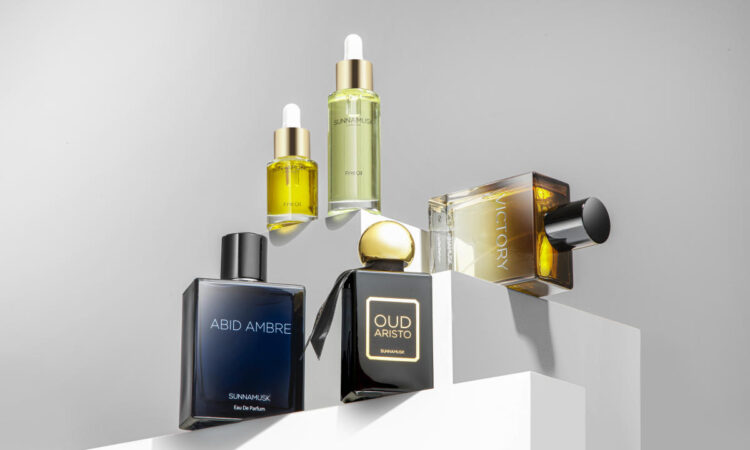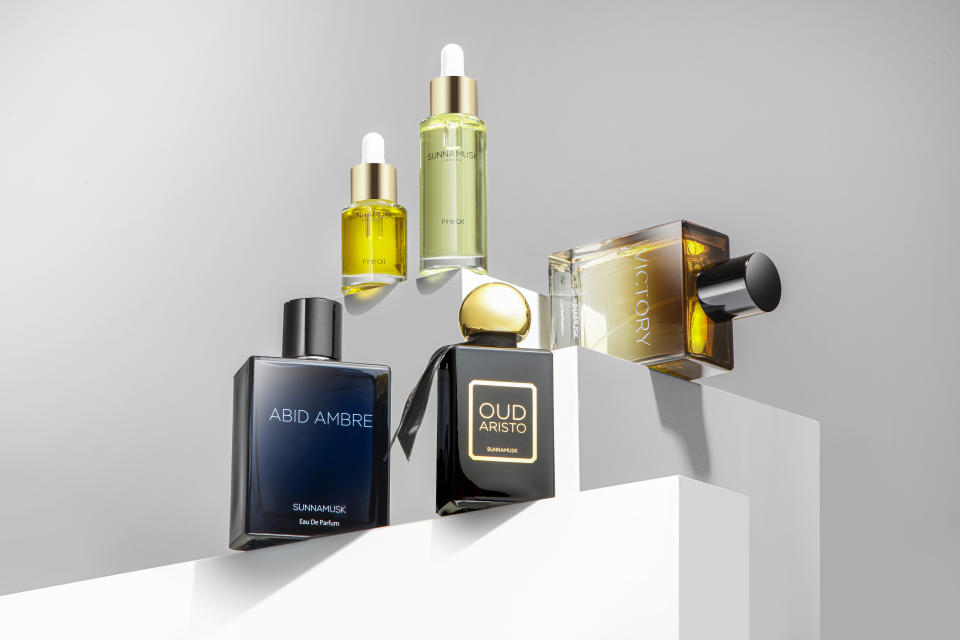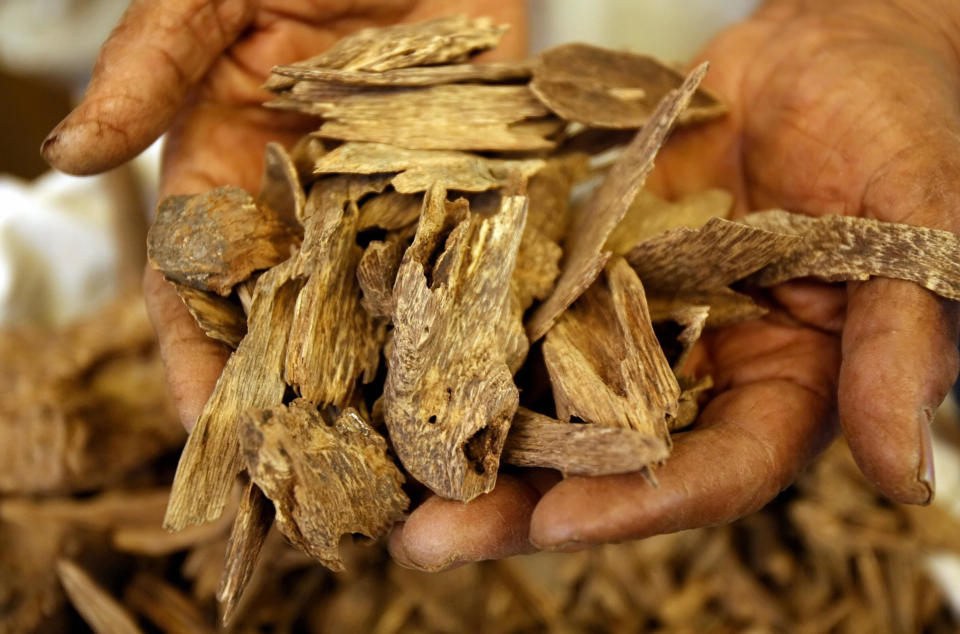



As the pandemic shuttered stores across the world, London-based Sunnamusk defied the odds and successfully expanded its Arabic fragrance business.
Sunnamusk co-founder Kazi Shafiqur Rahman and his brothers continued to launch new products throughout lockdown and eventually expanded their retail footprint to 17 stores, including two in Germany, between 2020 and 2021. Nowadays they count celebrities such as Amir Khan among their clientele.
“Our story is one of resilience, family bonds and fragrant dreams that refuse to fade, even in the harshest of times.”
Read more: Behind the brand: Prodigy Snacks, the chocolate company ‘fit for the modern day’
The company’s success harks back to Shafiq and his brothers’ decisions to pack in their day jobs to sell Muslim fragrances from market stalls and their car boot in 2010.
“I used to go straight to the stall after school,” said Shafiq’s younger brother, Abid, now CEO. “I worked everyday and at weekends, I believed in what we were doing.”
Thirteen years on, their online perfume business Sunnamusk now counts 26 outlets across the UK, Dubai, Europe and the US — and they’ve never needed to take out a bank loan.
A rags to riches story
Shafiq and Abid arrived with their parents and siblings in Tower Hamlets, east London, in 1997 from a rural village in Bangladesh. They ended up moving from one temporary accommodation to another for a decade, struggled to fit in and left school with failed GCSEs.
Then in 2009, their brother Lutfur, who was studying in Cairo, brought back a collection of small bottles of musk fragrances to the UK and convinced his siblings to try to sell them.
The brothers pooled £600 of their savings to start a family-owned perfume business in 2009 and sell 1kg of oud — an intense fragrant oil extracted from tree resin — fragrances.


They ended up storing perfume merchandise under beds, sofas and dining tables in their already overcrowded family home and on their first day of trading in Whitechapel, in the cold and rain, they made just £28.
Abid recalls a conversation he had as a 16-year-old with a young woman on the stall asking if the perfumes were from Hajj — whether the products were from Makkah in Saudi Arabia.
“It struck me that the only image of the Arabic scent was related to when Muslims went on pilgrimage and brought back scents as gifts,” he says.
Fuelled with determination, the brothers took the Sunnamusk concept and worked to make it desirable and now over 50% of their customers are non-Muslims.
They traded in Whitechapel market and then Ilford shopping centre. But their defining moment arrived when they opened a store in Westfield Stratford in 2011. They now have more than 20 stores UK-wide.
Read more: Behind the brand: Lush, the storytelling cosmetics retailer
“The opportunity was daunting, and the costs were high,” said Shafiq. “We owe it to our mum’s unwavering encouragement that gave us the courage to seize the offer.”
From that pivotal point, more success followed with a store in Aldgate, London in 2013, solidifying their presence in London’s fragrance scene.
Sunnamusk soon became synonymous with Arabian fragrances, making a splash in Ilford, Romford, and Lakeside with pop-up shops.
What is an oud-based fragrance?
Oud, also known as agarwood or aloeswood, is a resinous wood derived from the agar tree and produces a unique and long-lasting scent. The resin is then harvested for various products, primarily perfumes, and is also used as incense.


It takes 70 to 150 years to extract good oud so “obtaining the fragrance is exceptionally challenging”, explains Abid.
The resin only forms when the tree is infected by mould, which occurs in just 2% of trees, so the lengthy and delicate harvesting process, coupled with the agar tree’s rarity, contributes to its high cost.
The agar tree is among the world’s costliest timbers, further driving up prices due to its endangered status. The global market for oud is said to be valued at £5bn.
Mostly sought after in the Middle East and Southeast Asia, its popularity in the UK and the US has grown recently, largely due to social media, particularly TikTok, according to Abid.
Oud’s popularity stems from its distinct and luxurious scent, making it a prized ingredient in the fragrance industry. It traces its origin back to Assam, India, with a history dating back to ancient cultures, where it was known for its skin-friendly qualities and is often used in traditional medical practices.
Read more: ‘We turned down Dragons’ Den offers – our eyecare company is worth £7m now’
It is characterised by smokiness, spiciness, muskiness, woody notes, hints of vanilla, and tobacco undertones.
Asked which is his favourite fragrance, Abidur chuckled and said it’s like choosing between children, though he did say Sunnamusk’s Abid Ambe was one of his favourites.
Thriving through the pandemic
At the start of lockdown, Sunnamusk was already generating £2m a year and the founders, worried whether their small business would survive, came up with a plan to to sell oud-based hand sanitisers to keep the company afloat.
“Even in the face of the relentless pandemic, we not only survived but thrived. We shifted our focus online, navigated the storm and emerged stronger and broke our own monthly sales records during lockdowns,” said Abid, who in 2018 became the CEO at the age of 23.
As the UK braced for lockdown to be lifted the brand approached shopping centres and secured deals with the Trafford Centre in Manchester and Sheffield MeadowHall to boost in-person consumer activity in large shopping spaces.
Behind the Brand: Sunnamusk on…
How far they’ve come
Signature fragrances like Golden Dust and Abid Ambre are now becoming household names for Sunnamusk.
With 20 sites in the UK and in Europe including Germany, Sweden, France and plans to open a further 10 sites, Sunnamusk stands as a leader in the Arabian scent industry.
The brand now employs 179 staff and has taken total sales from £1-1.5m in 2018 to £10m last year.
“We’re working with global brands, we want to focus on our international expansion and reach over a £100m business turnover in five years time,” says Abidur.
Getting this far
Asked what he would say to his younger self Abidur says: “Always be on the lookout for people to bring on to your team, talented, loyal and passionate. People are the most important thing behind the brand.”
Looking back on the Sunnamusk journey, making mistakes has been part of the process. These included not protecting their trademark and signing up for software not quite right for the business, Abid reflects.
Sunnamusk will remain a family-owned business, with all five brothers as shareholders and Abidur at the helm, the company says.
Watch: How to detoxify your skincare regime
Download the Yahoo Finance app, available for Apple and Android.






